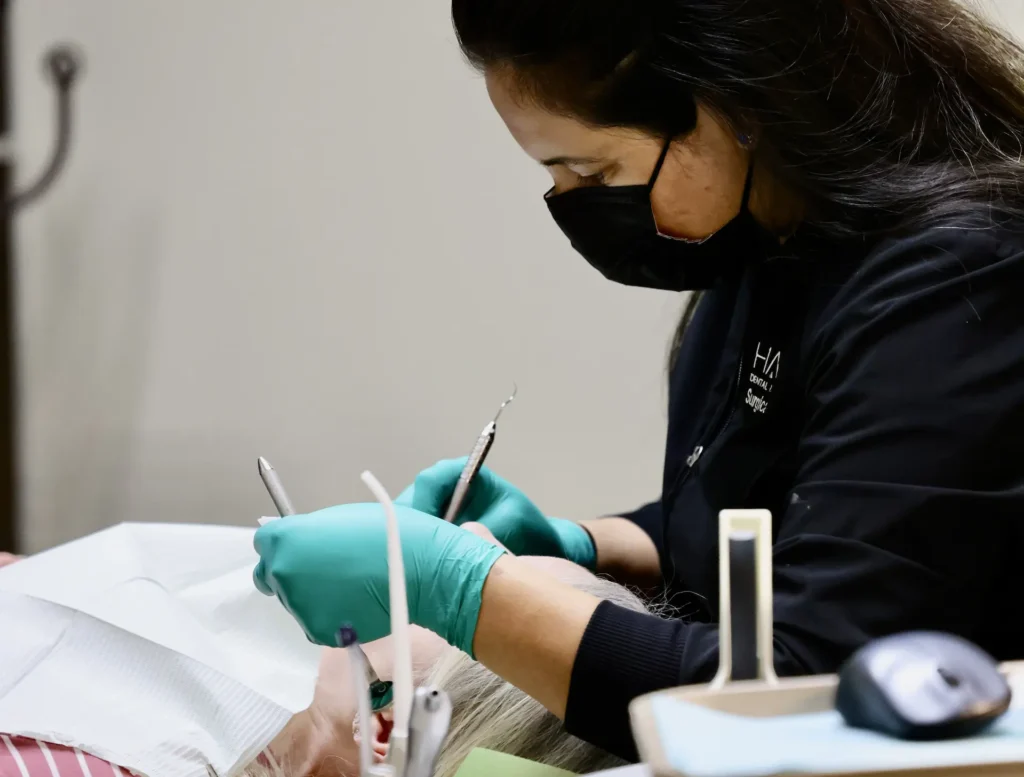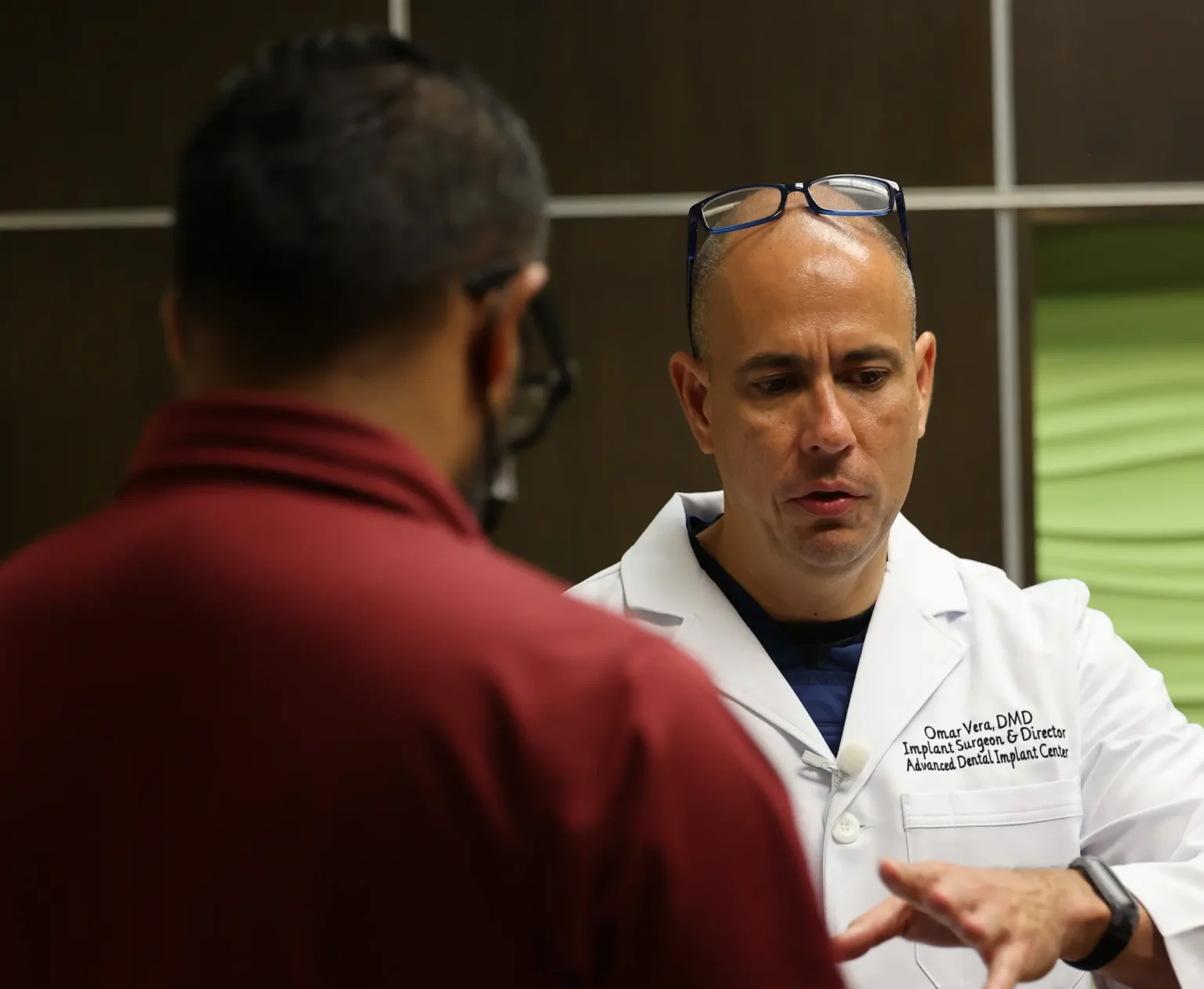Sinus pain is a common problem. It can happen because of allergies, colds, or infections. But did you know that dental issues can also cause sinus discomfort? Your upper teeth are close to your sinuses. If you have an infection, impacted tooth, or severe decay, it can affect your sinuses and cause pain.
Ignoring dental problems can make things worse. You may feel pressure in your cheeks, a stuffy nose, or even a headache that won’t go away. If your sinus pain keeps coming back, your teeth could be the reason.
Our team at Hanna Dental Implant Center specializes in diagnosing and treating dental issues that affect sinus health. Whether you need a filling, an extraction, or dental implants, our expert team will help you find lasting relief.
Keep reading to find out how bad teeth can cause sinus problems.
Key Takeaways
- Bad teeth, or more specifically infections in the upper jaw, can cause sinus problems.
- Your upper teeth are close to your sinuses. Infections, impacted teeth, and severe decay can put pressure on your sinuses and cause discomfort.
- Common symptoms include cheek pain, a stuffy nose, headaches, and tooth pain that doesn’t go away.
- Dental implants can replace damaged or missing teeth, preventing future sinus issues.
- Hanna Dental Implant Center offers expert care to treat dental issues and help you feel better. Contact us now to find the right solution for you.
How Your Teeth and Sinuses Are Connected

The largest sinuses, called the maxillary sinuses, sit just above your upper teeth. In some people, the roots of their molars extend into the sinus cavity.
When your teeth are healthy, your sinuses stay unaffected. But when you have a dental problem, it can create pressure, pain, and even infections that spread into the sinuses. A tooth decay, for example, can cause swelling near the sinus lining. This may lead to congestion, facial pain, or a feeling of fullness in your cheeks.
Even dental procedures can affect your sinuses. If a tooth is removed and not replaced, the bone in that area can shrink over time. This may cause the sinus to drop lower, making future dental work more complicated.
Common Dental Problems That Can Cause Sinus Pain
If your upper teeth aren’t healthy, your sinuses can suffer. Some dental problems create pressure, pain, and even infections that spread to your sinuses. Here are the most common ones:
Impacted Teeth
An impacted tooth is stuck under the gum and can’t fully come out. This happens when there isn’t enough space for the tooth to grow. It often causes pain, swelling, and pressure in your jaw.
If the impacted tooth is in the upper jaw, it can press against the maxillary sinus. This may cause sinus pain, stuffiness, and even headaches. You might feel pressure in your cheeks or around your nose, making it seem like a sinus infection when it’s actually your tooth causing the problem.
Wisdom Teeth
Wisdom teeth are the last set of molars to grow. They often don’t have enough room, leading to impaction. If a wisdom tooth in the upper jaw is stuck or growing at an angle, it can press against your sinus cavity.
This can cause sinus pressure, tenderness in your face, and difficulty breathing through your nose. Some people even develop swelling in their cheeks or feel pain when they chew.
Abscessed Teeth
An abscessed tooth has an infection deep inside the root. The infection forms a pocket of fluid, which causes throbbing pain and swelling. If the abscessed tooth is in the upper jaw, the infection can spread to the sinus cavity.
When this happens, you may feel pressure in your cheeks, have a runny nose, or experience a dull ache in your face. Some people even develop a fever or a bad taste in their mouth. If left untreated, the infection can grow and cause serious sinus problems.
Treating Tooth-Related Sinus Pain
Sinus pain linked to a dental problem won’t go away with allergy medicine or nasal sprays. You need to treat the root cause which is the issue in your tooth. When you come to us, our expert dental specialist will examine your teeth, take X-rays, and help you find the right solution.
How Dental Implants Can Provide Relief
If bad teeth are causing your sinus pain, fixing the problem is the best way to get relief. In many cases, dental implants can be the right solution.
A dental implant replaces a damaged or missing tooth. It works like a natural tooth and restores both function and appearance. If an infected or abscessed tooth is removed, replacing it with an implant can prevent future problems, including sinus pain.
Here are some of the benefits of dental implants:
- Stops infections from spreading – A decayed or abscessed tooth can allow bacteria to enter your sinuses. Replacing the damaged tooth with an implant removes the source of infection.
- Restores lost bone and support – When a tooth is missing, the bone in that area starts to shrink. This can cause your sinus cavity to drop, leading to pressure and discomfort. Implants help maintain the bone structure and keep your sinuses in place.
- Prevents sinus irritation – Some dental procedures, like extractions without replacement, can create openings between your mouth and sinuses. Implants seal these gaps, reducing the risk of sinus infections.
- Improves chewing and comfort – If you have a painful or missing tooth, you may chew differently, putting extra strain on your jaw and sinuses. A dental implant restores normal function, relieving unnecessary pressure.
Let Us Help You Stop Sinus Pain by Fixing Your Dental Health!
Problems like infections, abscesses, or missing teeth can affect your sinuses, causing discomfort that won’t go away with regular sinus treatments.
The good news is that you don’t have to live with the pain. Fixing dental issues can relieve pressure, prevent infections, and improve your overall health. Dental implants can be a long-term solution if you have damaged or missing teeth affecting your sinuses.
This is what we do atHanna Dental Implant Center. We specialize in restoring healthy smiles and improving oral health. If you have sinus pain that won’t go away, we can help. Contact us now to get started!
Frequently Asked Questions
How do you know if a tooth is causing sinus problems?
If your sinus pain comes with upper tooth discomfort, your tooth could be the cause. Symptoms include pressure in your cheeks, a stuffy nose that won’t clear, and pain that worsens when you lie down or chew. If sinus treatments don’t work, see a dental specialist to check for a dental issue.
How do I know if my tooth infection has spread to my sinus?
A tooth infection that spreads to the sinuses can cause facial swelling, a bad taste in your mouth, and a thick nasal discharge with a foul smell. You may also feel severe pressure in your cheekbones or around your nose. If you have these symptoms, see a specialist immediately to prevent serious complications.
Can decaying teeth cause sinus problems?
Yes. Severe tooth decay can cause an infection at the root of the tooth. If the affected tooth is in the upper jaw, the infection can spread to the sinus cavity, causing pain, congestion, and pressure. Treating the decay early can prevent sinus problems.
Which teeth are connected to the sinuses?
Your upper molars and premolars are closest to your maxillary sinuses. The roots of these teeth can extend into the sinus cavity. If these teeth become infected, the infection can reach the sinuses and cause discomfort.


